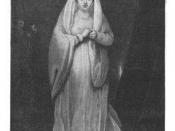The great Shakespearean tragedy Macbeth is a tale of deceit and treachery. One of Shakespeare's shortest plays, it is also one of his finest. The tragedy is about a Scottish Thane, Macbeth, Thane of Glamis, who, seemingly according to a prophecy of witches, becomes Thane of Cawdor, and King (King through treachery of course). And because Macbeth has gained his throne through treacherous ways, he loses it, just as soon as he gains it. Who or what brought about the downfall of Macbeth? It could be a combination of many people, Macbeth himself, Lady Macbeth and the witches. Where does the blame really lie? In my opinion, the blame is not with one of them, but with all of them.
Enter the first act, second scene. We see good King Duncan and his Thanes, talk about the outcome of a war well won. All the men seem to praise good Macbeth.
A first impression is made that Macbeth is a good man, not a treacherous one.
""For brave Macbeth - well he deserves that name -""
1:2, 16
He receives the praise of his peers, and is well respected. What could turn a man like this to villainous ways? Only his own ambition, his own pride could have drawn him down the whole dark path. But something, or someone, must have egged him on.
""FIRST WITCH
All hail, Macbeth! Hail to thee, Thane of Glamis!
SECOND WITCH
All hail, Macbeth! Hail to thee, Thane of Cawdor!
THIRD WITCH
All hail Macbeth, that shalt be king hereafter!""
1:3, 57-59
Here we receive the prophecy of the Three Witches. Hailing Macbeth Thane of Glamis is nothing new. Macbeth is already Thane of Glamis. Macbeth has not yet heard of the treachery of the Thane of Cawdor, how he betrayed...


